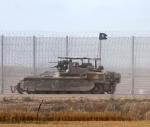You are here
The end of Daesh
Feb 14,2019 - Last updated at Feb 14,2019
Last Wednesday, US President Donald Trump said: "It should be announced, probably sometime next week, that we will have 100 per cent of the [Daesh] caliphate." Well, it is next week now, and by the weekend Trump will probably have made exactly that announcement. He will be right, too: Daesh as a major threat has been defeated for good.
A number of other claims will then be made in short order. Trump, of course, will claim that it is his victory and only his, although he was actually only carrying through with the strategy laid down by Barack Obama. On the other hand, give him credit for having the wit to stick to that strategy, even though he missed no opportunity to trash Obama’s achievements.
Various other people, mostly in Washington, will hasten to point out that Daesh is far from defunct as an organisation. It is losing the last of the territory it once held, but it carried out lots of terrorist attacks before it controlled any territory. It will continue to do so after it has lost it all again. You cannot ‘defeat’ terrorism; you can only contain it.
Daesh was a group that broke away from Osama Bin Laden’s original fundamentalist extremist organisation, Al Qaeda, and the main reason for the rupture was that some members thought the time was ripe to create an actual Islamic caliphate. Bin Laden disagreed, so they defied him and created Daesh anyway.
At its peak, in mid-2015, Daesh controlled around half the territory of both Syria and Iraq and ruled over more than 7 million people. It looked impressive, but it was only possible because the Syrian government was fighting, and at that point losing, a civil war, while Iraq was greatly weakened after the withdrawal of American troops.
Later in 2015, Russia intervened on the side of the Syrian regime, which has now won its civil war, and the return of American troops to Iraq enabled that government to recover all its territory by mid-2017. The last villages in Syria that were once part of Daesh will be recaptured this week, whereupon Trump will bring the US troops in Syria home, and the surviving Deash fighters will revert to simple terrorism.
Bin Laden was right: Daesh’s great mistake was to create a target, an actual state that could be successfully attacked by an army. Various armies duly did just that, and now Daesh is gone, while Al Qaeda, the parent organisation, carries on. But it no longer uses that name in Syria, as it attracts unwelcome Western attention.
For years, Al Qaeda’s Syrian branch called itself Al Nusra, and now it trades as Hayat Tahrir Al Sham, Organisation for the Liberation of the Levant, but it is still Al Qaeda in all but name. And there is one place in Syria where Al Qaeda does control territory despite the late Bin Laden’s views: Idlib province in the northwest, hard up against the Turkish border.
The Idlib enclave came into being more or less by default, because that was where Syrian rebel groups were sent when they surrendered to Syrian President Bashar Assad’s government elsewhere in Syria. As a result, the province’s population has doubled to 3 million people, and over the past year, Al Qaeda has fought a series of small wars that brought all the other rebel groups there under its control.
So, Al Qaeda in Idlib now controls a border, has significant resources and commands around 50,000 fighting men. It is a state for all practical purposes, although for doctrinal reasons Al Qaeda avoids using the term, and as a state it is an appropriate target for an army to destroy. When will that happen?
It depends on when Russia and Turkey decide to do something about it. The Turkish government used to support various rebel Islamist militias against Assad, but all its local allies have now been subjugated by Al Qaeda, which Turkish President Recep Tayyip Erdogan is much less enthusiastic about.
Russia has never supported any Islamist forces and would happily help Assad to take back all of Idlib tomorrow. However, Moscow currently hopes to detach Turkey from NATO and turn it into an ally, and therefore probably will not move against Al Qaeda until Erdogan gives it a green light. That may take some time.
There is also the question of what happens to the Syrian Kurds, who allied themselves to the United States and carried the main military burden of destroying Daesh in Syria. They hoped to get independence from Syria, or at least autonomy within Syria, as a reward for their efforts, but Turkey will not allow that, and in the end, the US will betray them. Again, however, this may take some time.
So, it could be a year yet before the wars that have ravaged the greater Middle East since the American invasions of Afghanistan in 2001 and Iraq in 2003 finally die down, but it will come. And as the floodwaters recede, the political landscape will reemerge almost unchanged, apart from a little more democracy in Iraq and quite a lot less in Turkey.













